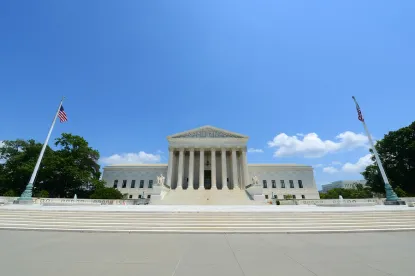On April 1, 2021, the U.S. Supreme Court in the class action case of Facebook, Inc. v. Duguid, No. 19-511, resolved a circuit court split on the meaning of automatic telephone dialing system (“ATDS”) under the Telephone Consumer Protection Act (“TCPA”) by unanimously reversing the Ninth Circuit’s broad definition and narrowly interpreting ATDS. Bringing much needed clarity the Federal Communications Commission has not been able to provide to date, the Supreme Court held that to qualify as ATDS “a device must have the capacity to store a telephone number using a random or sequential number generator, or to produce a telephone number using a random or sequential number generator.” This ruling significantly narrows liability, including class action liability, under the TCPA.
The TCPA, in part, prohibits calls and texts to cell phones using an ATDS without sufficient prior express consent or an exemption. An ATDS is defined by statute as “equipment which has the capacity—(A) to store or produce telephone numbers to be called, using a random or sequential number generator; and (B) to dial such numbers.” Though the TCPA has other prohibitions, over the past decade most TCPA class action litigation with the greatest potential liability has involved calls to cell phones using ATDS.
The interpretation of ATDS has been hotly disputed for many years, resulting in a Circuit split. The Third, Seventh, and Eleventh Circuits have narrowly interpreted ATDS. The Second and Ninth Circuits have broadly interpreted ATDS. The Supreme Court has resolved this split by unanimously siding with the narrow interpretation.
In Facebook, Inc. v. Duguid, the plaintiff Noah Duguid sued Facebook on a class action basis, alleging that it violated the TCPA by sending him text messages using an ATDS. Facebook, Inc. v. Duguid, 926 F. 3d 1146 (9th Cir. 2019). Duguid alleged that Facebook maintained a database of phone numbers and programmed its equipment to automatically generate text messages to those stored numbers. The district court concluded that Duguid inadequately alleged that Facebook sent its messages using an ATDS because Duguid’s allegations suggested direct targeting that is inconsistent with random or sequential number generation that is required under the TCPA.
On appeal, the Ninth Circuit reversed the dismissal of Duguid’s complaint and reiterated its decision in Marks v. Crunch San Diego, LLC, 904 F.3d 1041 (9th Cir. 2018) that “an ATDS need not be able to use a random or sequential generator to store numbers[.]” The Ninth Circuit ruled that “it suffices to merely have the capacity to ‘store numbers to be called’ and ‘to dial such numbers automatically.’”
The Supreme Court disagreed and reversed the Ninth Circuit’s judgment. In a majority opinion authored by Justice Sotomayor, the Supreme Court ruled that to qualify as an ATDS, a device must either (i) store a telephone number using a random or sequential number generator, or (ii) to produce a telephone number using a random or sequential number generator. Thus, merely having the capacity to store numbers (e.g. a list of phone numbers) and to dial them randomly is insufficient to qualify as an ATDS.
Beginning with the text of the statute, the Supreme Court concluded that the clause “using a random or sequential number generator” modified both verbs that precede it, i.e. “store” and “produce,” as opposed to just “produce.” The Court explained that under the conventional rules of grammar, ‘“[w]hen there is a straightforward, parallel construction that involves all nouns or verbs in a series,’ a modifier at the end of the list ‘normally applies to the entire series.”’ The Court found that this interpretive rule recommends qualifying both “store” and “produce” with the phrase “using a random and sequential number generator.” The Court noted this was the most “natural construction” of the definition and that Duguid’s interpretation “would capture virtually all modern cell phones, which have the capacity to ‘store . . . telephone numbers to be called’ and ‘dial such numbers.”’ Thus, Duguid’s interpretation could “affect ordinary cell phone owners in the course of commonplace usage, such as speed dialing or sending automated text message responses.”
In addition, the Supreme Court explained that Congress expressly found that the use of random and sequential number generator technology caused unique problems and narrowly defined ATDS to prohibit technology that can randomly dial emergency lines or tie up sequentially numbered phone lines at a single business. Thus, the Court concluded that legislative purpose also supported a narrow interpretation of ATDS.
What does this mean?
This means that in most cases there will not be any liability under the TCPA for automatically calling or texting cell phones from a stored list of numbers, such as a database of current or former customers or debtors. Plaintiffs may still try to argue that even if randomly or sequentially generated numbers are not automatically dialed there can still be liability if the equipment has the “capacity” to generate such numbers. Plaintiffs may argue that predictive dialers have such capacity. However, Plaintiffs will have a stiff uphill battle to prove such equipment qualifies as an ATDS based on the Supreme Court’s ruling and the D.C. Circuit’s rejection of a broad definition of the term “capacity” within the meaning of ATDS. ACA Int’l v. Fed. Commc’ns Comm’n, 885 F. 3d 687 (D.C. Cir. 2018).
Based on the Supreme Court’s narrow ruling on ATDS, it is likely that the plaintiffs’ bar will shift their focus away from TCPA actions based solely on the use of an ATDS and re-focus their attention on prerecorded and artificial voice calls, violations of the National Do-Not-Call regulations, and even fax cases, which are not addressed by the Supreme Court’s ruling. Plaintiffs may also turn their attention to state laws similar to the TCPA but with different standards or definitions of automatic dialing.
Notably, the TCPA still has teeth, particularly in class actions with statutory penalties of $500 to $1,500 per call/text/fax. However, the Supreme Court has just pulled the sharpest teeth.




 />i
/>i

